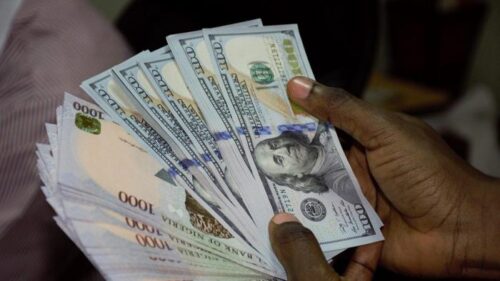
The Nigerian naira weakened against the US dollar on Tuesday across both official and parallel foreign exchange (FX) markets, following a dip in dollar inflows recorded the previous week.
The currency depreciation coincided with a pipeline explosion on the Trans-Niger Pipeline (TNP), a major oil transport route with a capacity of approximately 450,000 barrels per day.
Data from the Central Bank of Nigeria (CBN) showed that the naira fell by 0.3 percent (N4.90), as the dollar was quoted at N1,532.94 on Tuesday, compared to N1,528.03 on Monday at the Nigerian Foreign Exchange Market (NFEM).
At the official market, traders reported the highest dollar rate at N1,549.50, slightly stronger than the N1,552 quoted the previous day. The lowest transaction rate stood at N1,522.70, down from Monday’s close of N1,512.
In the parallel market, commonly referred to as the black market, the naira depreciated further, closing at N1,580 per dollar—a loss of N5 compared to the previous day’s N1,575.
Meanwhile, the naira appreciated against the British pound, gaining N10 to trade at N2,040 from N2,050 on Monday. It remained stable against the euro at N1,700 and the Canadian dollar at N1,150. The Chinese yuan was exchanged at N1,215 in the black market.
The FX market recorded an inflow of $1.0 billion last week, reflecting a 25.4 percent decline from the $1.34 billion received the previous week, according to a report by Coronation Asset Management.
The recent explosion on the Trans-Niger Pipeline has raised concerns about potential disruptions to oil production and export revenue, which could further strain Nigeria’s dollar supply.
Adding to the challenges, Nigeria’s crude oil sector is experiencing weak demand. As of March 12, crude cargoes remained unsold, with traders still seeking buyers for shipments dated as early as March 10. Much of Nigeria’s April export schedule also remains unclaimed, according to data from Argus.
Market analysts have linked these struggles to broader economic factors, including rising trade tensions between the US and key global partners, as well as OPEC+ production quota adjustments. These developments have contributed to price volatility in the global oil market.
A report by Afrinvest Securities Limited highlighted that Brent crude prices declined by 2.4 percent week-on-week, falling from $72.49 per barrel to $70.82 per barrel.
With Nigeria’s economy heavily reliant on oil revenue, continued volatility in global crude prices and weak export demand could exert additional pressure on the naira in the coming weeks.



